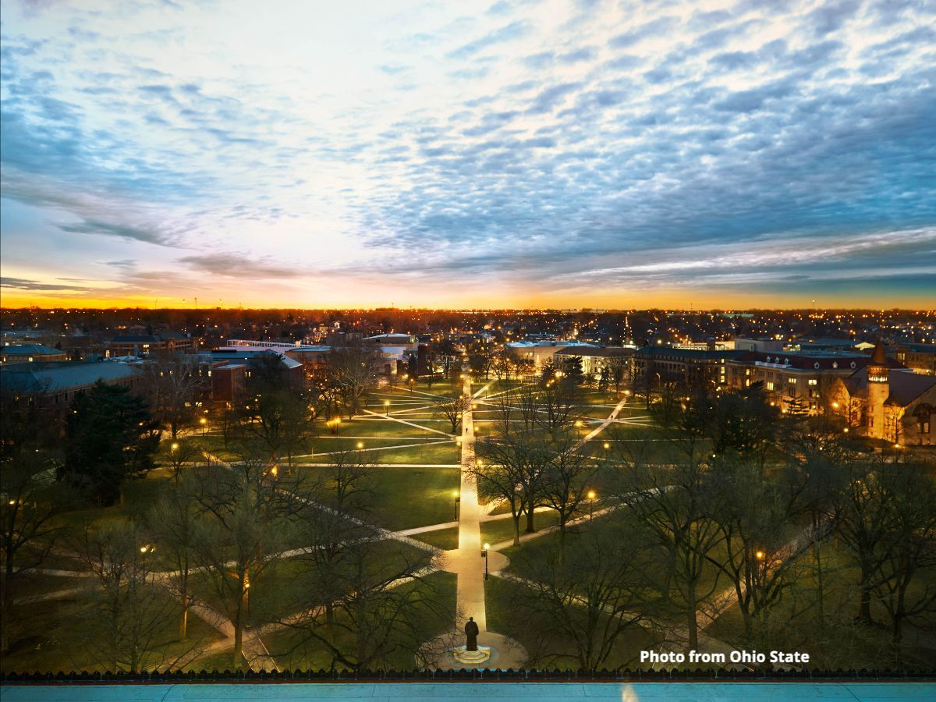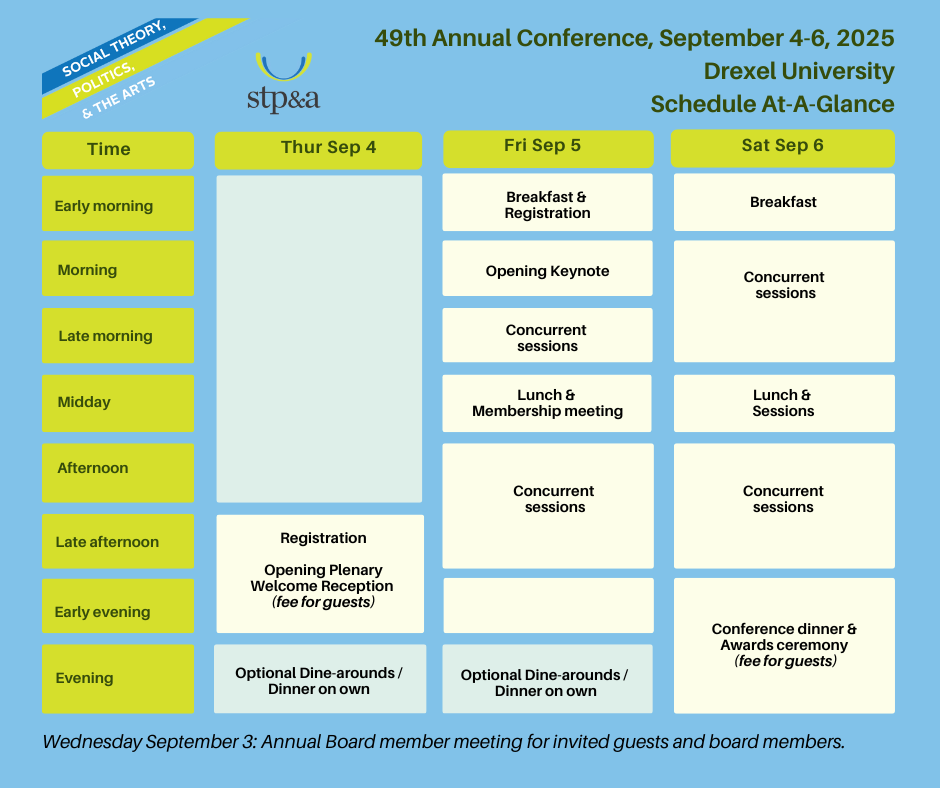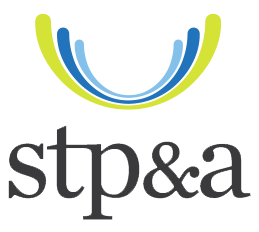STP&A 2026 Conference
50th Annual STP&A Conference
October 15-17, 2026
Columbus, OH
The Ohio State University
Conference Hosts
STP&A is excited to partner with faculty and partners at Ohio State to host the 50th annual conference. Registration will open late spring, 2026.


Schedule At-A-Glance & Attendee Guidance
Local Transit, Recreation & Dining. Coming soon.
Presenter technology. Coming soon.
Authors’ book table. Any registered attendee who is the author or editor of an academic book is invited to display their work. This is an opportunity to showcase, not sell, your work. Drop-off & Pick-up: Bring your book to the registration desk during check-in. Authors must retrieve their books by the close of the conference. Unclaimed books will not be returned. Contact vpconferences@stpaconference.org with questions.
- Authors are responsible for providing a copy of their book.
- Only one copy per title will be accepted.
- Books will be displayed in a designated area for the duration of the conference.

Important Dates
| Call for Proposals Announced | mid-March 2026 |
| Proposal Submissions Portal Opens | TBD |
| Proposal Submissions Portal Closes + Deadline to apply for conference scholarship via submissions portal + Deadline to express interest in being considered for a conference award via submissions portal | early May 2026 |
| Acceptance, Waitlist, Denial Letters | End of May 2026 |
| Conference Registration Opens | End of May 2026 |
| Conference Registration Deadline for Early Pricing | End of June 2026 |
| Extended deadline for accepted presenters to register to be included in conference program | TBD |
| Conference Registration Deadline for Standard Pricing + Deadline to submit papers for conference award consideration + Deadline to submit papers for presenters/authors accepted to ‘Research Paper & Discussion’ track | September 15, 2026 |
| Papers are distributed for review for the ‘Research Paper & Discussion’ track | TBD |
| Registration & Guest Registration Final Deadline + Deadline to submit final entries for conference book of abstracts | October 5, 2026 |
| Final Date to Request Cancellation | October 12, 2026 |
| 2026 STP&A Conference Dates | October 15-17, 2026 |
| Deadline to submit conference manuscripts for JAMLS Special Issue | November 13, 2026 |
Call for Proposals
The STP&A Conference is the oldest and one of the most influential research gatherings in the field of arts management and cultural policy. STP&A conference participants stem from a broad range of disciplines from across the globe and value the interdisciplinary nature of the overall conference. STP&A heartily welcomes participants engaged not only in arts management and cultural policy research, but also researchers at the various intersections of the arts, humanities, and social sciences.
Research stemming from STP&A conference presentation may be submitted to the Journal of Arts Management, Law, and Society for consideration in the special STP&A conference issue. Submissions will be due to JAMLS following the conference convening.
Conference Tracks
STP&A invites conference proposals related to arts management and cultural policy research and the various intersections of the arts, humanities, and social sciences. Given the interdisciplinary nature of the STP&A Conference and related research, all proposals will be considered within the delineated framework of 5 tracks, including an “open track.” If you have questions about the suitability of your proposal for conference consideration, please email STP&A: conference@stpaconference.org
1. Ecosystems of Creative Production and Participation
The arts and culture operate within interconnected social, economic, and institutional systems. This theme looks at how art and culture is made and what structures (e.g., policies, organizations, funding, labor conditions) shape the ecosystem.
Key words may include: aesthetics; arts and cultural participation; arts and cultural workforce/ labor/creative production; cultural policy and planning; heritage
2. Equity, Access, and Inclusion Across the Arts and Culture
This theme focuses on understanding and addressing inequities in both the consumption and production of the arts and culture—who is welcomed, who is supported, whose work is valued, and how systems can change to be more equitable.
Key words may include: inclusion in participation and/or audiences; labor equity; philanthropy (especially equitable funding); cultural policy with an equity lens
3. Infrastructure, Investment, and Sustainability
This theme examines the financial, policy, and structural supports required to sustain the arts sector, with a focus on managerial practices and policies that foster long-term resilience, fair compensation, adaptive governance, and organizational capacity.
Key words may include: arts management, systems and institutions; leadership and governance; organizational practices (as learning organizations)
4. Methodologies, Frameworks, and Ways of Knowing
This theme emphasizes the role of arts-specific ways of generating knowledge—creative inquiry, participatory research, embodied methodologies—and how these inform practice, pedagogy, and strategy.
Key words may include: arts-based research and methodologies; teaching and learning; cultural policy and planning (as knowledge-informed practice)
5. Open Track / Cross-Cutting Innovation
A designated theme for research that falls outside or across traditional boundaries and beyond the themes already outlined—supporting emergent ideas, hybrid practices, and experimental approaches. Encourages innovation and experimentation to surface new directions and disruptive thinking.
Key words may include: new theoretical provocations; cross-sector collaborations (health, tech, environment, justice, etc.); unusual partnerships or artistic experiments; topics not yet recognized in arts policy/education/management
Proposal Formats
STP&A accepts proposals for the following types of formats:
- Research Paper & Discussion Proposals
- Research Presentation Proposals
- Panel Proposals
- Interactive Sessions
Research Paper & Discussion Proposal
A 20-minute presentation and commitment to review 1-2 fellow presenters’ work in advance of the conference, forming 75-minute conference sessions. The purpose of this track is to provide opportunity for deep engagement with, and discussion of, works-in-progress that are intended for publication as a journal article, book chapter, or other publication. A “work-in-progress” is defined as a research paper that has been started, but may not be fully complete. Preliminary data collection, analysis, and findings are expected. The length of the paper should be typical for publication in an academic journal (approximately 6,000-10,000) words.
Upon acceptance, the author(s) written work is due approximately 4 weeks in advance of the conference convening. If the written work is not submitted by the due date, then accepted proposals may be transitioned for inclusion within the conference as a Research Presentation and authors notified of this change.
Members of the STP&A Scientific Committee and/or STP&A Board Members will be assigned to review written work and will serve as discussants.
To recap, authors accepted into the Research Paper & Discussion track are expected to:
- Share their work-in-progress in advance of the conference (approximately 4 weeks in advance of the conference convening)
- Read 1-2 other participants’ works-in-progress and prepare questions and remarks in advance of the conference
- Prepare and deliver a 20-minute research presentation
- Actively participate in intellectual exchange and discussion with all participants within their scheduled Research Paper & Discussion session
Research Presentation Proposal
A 20-minute presentation in a session with other research presenters, forming 60-75 minute conference sessions. This format has been the most traditionally included at STP&A conferences.
Research presentations may be based on completed work or work in development that exists in one of several forms, including, but not exclusive to scholarly papers, research reports, and performance-based research projects. There is no expectation for written work to be submitted in advance of the conference.
Research Presentation proposals should be submitted for studies that are to be fairly mature both conceptually and methodologically, ideally with some preliminary data analysis and findings that are suggestive of the impact and significance of the research, by the time of the conference. The Research Presentation should be a complete discussion of finalized data analysis and findings. The Research Presentation proposal may stem from the results of quantitative, qualitative, or mixed methods studies or report the findings of studies that use historical or philosophical methods. These studies are based on original data collection or secondary data analysis.
Research Presentations may also present well-developed arguments on philosophical, theoretical, or practical problems in the study of the arts. They are not required to adhere to an empirical research design (e.g., methods, data collection, and data analysis). Rather, such Research Presentations pose critical questions, synthesize divergent bodies of literature, or elaborate new theoretical or conceptual frameworks.
Research Presentations may also present performance-based research projects that may take the form of art, music, dance, spoken word, or theatrical performance in a standard classroom/conference space. Such Research Presentations proposals should describe how the research advances knowledge in the fields of arts administration and/or arts policy.
Panel Proposal
An up to 75-minute Panel Presentation typically consisting of 3-5 speakers in a session focused on a shared topic of inquiry, or that may consist of three to four research papers or other works that share a topic, approach, or other vital shared element that enhances the advancement of knowledge by being presented in a shared session.
A minimum of 3 speakers offering 3 unique perspectives (e.g. papers, experiences, etc.) are required for a panel, meaning that at a minimum of 3 speakers must register for and be in attendance for the panel presentation. In limited circumstances, if the number of required panelists cannot be met, Panel Presentation proposals may be converted to Research Presentations with approval from the Conference Committee.
The author of the Panel Presentation proposal will serve as the point of contact for all panelists.
Interactive Session Proposal
A 30 or 45-minute interactive session intended to provide a form of active engagement with participants. Such interactive sessions may, but are not limited to, take the form of workshops or facilitated discussions or meet-ups of STP&A members with shared affinities or research interests.
A workshop is a hands-on session that features interaction between and among the presenter(s) and the audience to advance knowledge of a particular issue or research problem.
Facilitated thematic discussions or research-focused meet-ups include a convening of members around shared affinities or research interests. Such proposals will describe and motivate the theme/topic of focus for the session, what the benefit of the session to participants will be, and describe the planned nature of facilitation for the session.
Interactive Sessions may be proposed by an individual or co-researchers/authors. The author of the Interaction Session proposal will serve as the point person for the panel.
Proposal & Submission Guidelines
Each proposal submission is to include:
- Title (150 characters or less)
- Abstract/overview (500 words or less):
- The abstract/overview may include in-text references.
- To facilitate the blind review process, individuals and institutions should not be identified in the body of the abstract/overview; e.g. use ‘author’s institution’ instead of using the name of the university or organization.
- The proposals for this conference are peer-reviewed and available online post-conference. By submitting to this conference, the author hereby affirms that the work submitted is theirs, original, and recent. Please provide the information below in the proposal abstract/overview and use the corresponding headings:
- Background
- Aims and objectives of the study (specific research questions where relevant)
- Methodology and/or theoretical approach
- Findings
- Conclusions and implications
3. Author(s)/presenter(s) information, which includes name, affiliation, email, and short biography (250 words or less) for each author/presenter.
Additional guidance and requirements:
- All proposals and final papers/presentations must be presented in English. If an interactive session is planned to be conducted in a language other than English, then the proposal must state the language in which it will be conducted.
- Proposals are accepted with single or multiple authors/presenters. Only one author/presenter should complete the proposal submission and will need the name, affiliation, email, and short biography (250 words or less) of each author/presenter. There is a limit of five authors/presenters per proposal.
- The maximum number of accepted Research Paper & Discussions and/or Research Presentations for any individual author is two. An individual accepted to the conference for two Research Paper & Discussions and/or Research Presentations, however, may also submit proposals for Interactive Sessions and may be accepted for one Interactive Session.
- Proposals can be edited within ExOrdo until the submission deadline.
Submit Proposals
Click on the button below or the link here to submit your proposal(s) to the 2026 STP&A conference; the button will take you to the proposal submission platform ExOrdo. You will need to create a login for the ExOrdo site if you do not already have one.
Conference Awards
Individuals who wish to be considered for either Emily Mulcahy Student Research Award or the Mulcahy Emerging Scholar Award, must meet the eligibility criteria for the respective award and additional requirements for award consideration. Individuals who meet one of the conference award’s criteria and want to be considered for the award must express their interest to be considered for the conference award at time of submitting their eligible conference proposal within the conference submission platform ExOrdo.
All individuals who wish to be considered for a conference research award must carefully review the eligibility criteria, award adjudication criteria, and be prepared to submit their papers by a 2026 deadline (to be announced).
Conference Registration coming soon
Prices for standard registration (after May 23) were amended because of the changing climate related to international travel. Student pricing will remain $330 and standard pricing was reduced to $525.
Membership is required for conference attendance. Learn more about STP&A Membership.
| Dates | Standard Registration Base Fee | Student Registration Base Fee |
|---|---|---|
| Early (register by May 23, 2025) | $495 | $330 |
| Standard (after May 23 and by August 1, 2025) | $525 (reduced from $550) | $330 (reduced from $360) |
| Late (after August 1, 2025) | $650 | $425 |
STP&A’s Conference Cancellation and Refund Policy
Conference registration cancellations must be made online in the ExOrdo Registration system. A conference registration cancelled on or before August 1, 2025, midnight eastern, is refundable minus a $50 USD processing fee. A conference registration cancelled after August 1, 2025, midnight eastern will not receive a refund. The refund and cancellation policy will not be waived. In this case, the individual may choose one of the following two options:
- Convert the amount paid for conference registration to a donation to STP&A; or
- Transfer the amount paid for conference registration (not for membership) to the following year’s conference registration fee; the amount paid for registration may be transferred only one time to the next conference. If option 2 is chosen, and the carried-forward registration fee is cancelled before or after the deadline for refund/cancellation for the conference to which it is newly applied, then the individual is not entitled to any refund or the option to transfer the amount paid to a future year.
In the event STP&A must cancel the conference due to unforeseen circumstances, STP&A will refund the full amount paid by each conference registrant for the conference registration fee. The refund will equal the paid amount for the conference registration ONLY and NOT to the membership fee, which is typically bundled with conference registration. If the conference registrant paid additional fees for pre- or post- conference activities, or other add-ons to the registration fee, STP&A will make all efforts to reimburse such payments in full. STP&A does not assume responsibility for any additional costs, charges, or expenses including charges made for travel and lodging.
Transportation
Coming soon.
Accommodations
The Graduate Hotel
50 king rooms at $122 per night blocked at The Graduate Hotel. Reservations in the block should be booked by September 15th to access this rate.
Address: 750 N High St, Columbus, OH 43215
Directions to Conference: The Graduate Hotel is 1.5 miles from Sullivant Hall, where the main conference activities will take place. It takes 6 minutes by car, 34 minutes by foot, or a short ride on the city bus ($2).
The Blackwell Inn
12 king rooms blocked at The Blackwell Inn, our on campus hotel. Reservations in the block should be booked by September 14th.
Address: 2100 Neil Ave, Columbus, OH 43210
Directions to Conference: The Blackwell inn is 0.8 miles from Sullivant Hall, where the main conference activities will take place. It takes 4 minutes by car, 17 minutes by foot, or a short ride on the city bus ($2).
